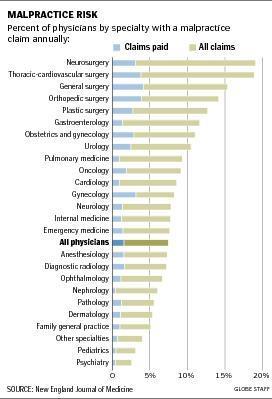Hello Doctor. I Wouldn't Hesitate To Sue You
 Guest post by Dr. Mandy Huggins
Guest post by Dr. Mandy Huggins
How many times during your day does the specter of a malpractice law suite rear its ugly head?
“I wouldn’t hesitate to sue you.”
"I’m sorry, what?"
That is what I heard from the mother of one of my patients. At the time, I was only 2-3 months into practice, and I was evaluating a high school athlete who had recurrent stingers and a possible episode of transient quadriparesis . I wasn’t on the sidelines for these injuries, so I had to go on the reports given to me by the athlete and the school’s athletic trainer. However, with that information, I did not want to clear this player to return to football until I could be certain he didn’t have cervical stenosis or any other abnormality that might put him at risk for permanent damage if he suffered another neck injury. I told the athlete and his mother that I needed to get an MRI of his cervical spine in order to determine this. The athlete was understandably upset with my decision, but his mother supported my decision to proceed with caution. She explained to me that if her son played again, sustained another injury, and something “bad” happened, she would be more than happy to take legal action against me.
Fantastic.
First of all, I can’t say that I would blame her for being angry (at the very least) if I screwed up. But to tell me in my office, to my face, that she’s already thinking about suing me? I found that ridiculous. I must be in the minority, however. If you Google “how to sue a doctor,” an abundance of information follows. There’s an “ehow” on the subject, and even CNN offers an opinion.
I’m sure many can offer some anecdote about how a physician did this or that wrong, and I agree that there are some bad apples out there. That’s not the point of this post. The point is, way too many people are looking, just waiting, for something to happen to they can “get theirs.” It’s disappointing, and quite frankly, very scary. I didn’t go through a lifetime of education and training to doubt everything I do for fear of a law suit. I’m lucky; my specialty is non-surgical and rarely deals with critical health issues. But I’m hardly in the clear. A 2011 study in the New England Journal of Medicine estimated that by the age of 65, “75% of physicians in low-risk specialties had faced a malpractice claim, as compared with 99% of physicians in high-risk specialties.” So I have a 75% chance, give or take, that I’ll be named in at least one claim during my career. Of course, not all of these claims go to court and/or end up with the plaintiff being awarded, but you can see how frequently patients are quick to take action if they think they’ve been wronged.
I’ll continue to do what I’ve been trained to do – practice good, evidence-based medicine, communicate well with my patients, and document the you-know-what out of everything. But at the end of the day, the fear of a malpractice claim, valid or not, will always be in the back of my mind.
About: Dr. Mandy Huggins, MD is a sports medicine physician who practices in south Florida. She is board certified by the ABPMR and holds an added certificate of qualification (CAQ) in Sports Medicine. Learn more about Dr. Huggins at http://www.drmandyhuggins.com/.





 3 Comments
3 Comments
